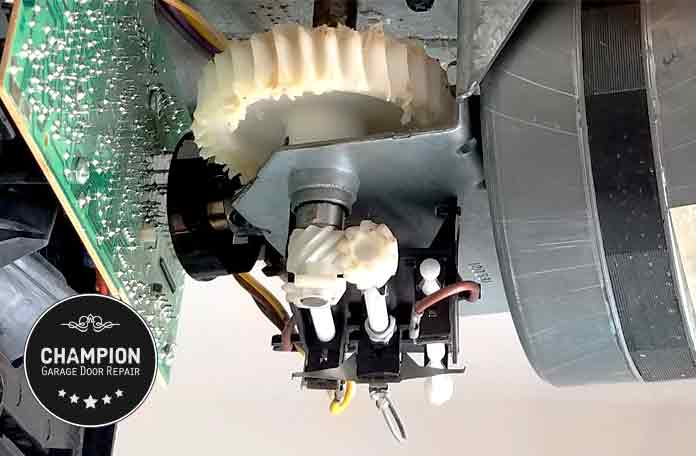Garage doors often seem to communicate in their own language, filled with squeaks, screeches, and bangs. For most of us, these noises become a regular part of the garage door’s operation until an issue arises. While deciphering your garage door’s messages might be challenging, paying attention is key because unusual noises can signal potential trouble. Let’s explore some of the more common sounds your garage door makes and what they might indicate.
Popping Sounds
A popping noise when the garage door is opening, which may also resemble a clunking or grinding noise, could indicate wear or binding of the torsion springs during the coil-twisting motion as the garage door opens. Inspect the springs for defects or breakage and lubricate the springs’ coils to eliminate the noise.
Popping sounds coming from the garage door could signal a broken or loose hinge, misalignment of the torsion assembly, tracks, or supporting brackets. Inspect the overhead door system and perform any necessary repairs.
Newly painted garage doors might also produce a popping sound, often attributed to the adhesive properties of the fresh paint. As the paint is applied, it forms a tight bond with the surface, and during the drying and curing process, subtle noises like pops may occur. This is a natural part of the painting process and doesn’t necessarily indicate an issue with the door itself.
A garage door opener that produces a popping sound during operation, which may also resemble a clunking or grinding noise, could indicate that the opener’s sprocket is about to break or is already broken. Inspect the door opener and replace the gear and sprocket assembly as needed.
Thumping and Banging Sounds
A loud, one-time bang sound from the garage could signal a broken spring. This noise occurs when the spring abruptly releases the stored torque during a snap. If the spring is broken, the garage door will likely fail to open. Replace the broken spring as necessary.
Thumping and banging sounds, which may also resemble popping noises, coming from the garage door when it moves up and down are often indicators that one or more sections of the door are starting to fail or have cracks. Structurally damaged door sections may buckle under their own weight, leading to the garage door failing to close or even coming off its tracks. Repair worn sections with designated reinforcement struts, or replace the sections if needed.
Electric overhead garage doors might produce thumping or banging sounds due to a misconfigured or faulty opener’s travel system. A defective travel module or limits switch can cause the door to travel excessively along the opener’s rail.

This malfunction may overpressure the opener’s mechanisms, leading to premature wear of the gears and sprockets, as well as causing the garage door cable to come off the pulley. Inspect the door operator, check for error codes, and perform any necessary repairs.
Squeaking and Squealing Sounds
A garage door making squeaking or squealing sounds could indicate issues with the garage door rollers, center bearing, end bearings, and hinges. These sounds are often caused by increased friction between metal parts. In most cases, you can fix a squeaky garage door and eliminate noises simply by identifying where the squeaks are coming from and then applying some lubrication to the affected parts. If rollers and bearings are already structurally damaged, they may need to be replaced.
Screeching Sounds
Screeching sounds may indicate that the garage door top and bottom brackets are binding against the door tracks. Inspect the door brackets and adjust the tracks as necessary.
Grinding Sounds
A garage door that makes a grinding sound when it opens and closes could indicate that the garage door opener trolley is worn out, the torsion assembly is misaligned, a cable is not wrapping properly around the pulley, or the rollers are faulty. Inspect the torsion assembly and look for metal shavings or black powder near the contact points between the torsion tube and the bearings. Additionally, inspect the opener trolley, door cables, lift cable drums, and rollers for wear, and perform any necessary repairs.
Creaking Sounds
Creaking sounds could mean that there are loose hinges, supporting components, tracks, bolts, nuts, and screws. In some cases, however, it could just be a gradual wear or deformation of the overhead door system and the door sections due to regular operation, constant exposure to environmental conditions, or improper maintenance. Tighten all bolts, screws, and nuts, and lubricate the garage door as necessary.
Humming and Buzzing Noises
The humming or buzzing noise from electric garage door openers during operation, whether DC or AC, is caused by vibrations during their operation. When the motor is turned on, magnetic fields are created, leading to mechanical vibrations that produce audible noise. Factors like loose parts, imbalance, misalignment, manufacturing imperfections, and the opener’s motor design can contribute to these vibrations, resulting in the humming or buzzing sound. It’s a normal part of motor operation, but some measures can be taken by door manufacturers in the design and construction to minimize it.
If your garage door opener makes a humming or buzzing noise while malfunctioning, it could indicate problems with the opener’s transformer, capacitor, motor, or control board. It could also be that the opener’s carriage is stuck against the end of the rail. Check for error codes and replace any necessary parts. Inspect the opener’s carriage. If it’s stuck on the rail’s end, loosen the chain or belt to shift the carriage away from the end. Retighten the chain or belt and adjust the motor’s travel if needed.
Clicking Noise
If your electric garage door opener makes a single clicking noise while malfunctioning, it could indicate problems with the opener’s transformer, capacitor, motor, or control board. Look for error codes and replace defective parts as necessary.
If the door opener is clicking 6 to 10 times with blinking lights and the door won’t close, it could indicate that the garage door sensors are not aligned, dirty, defective, or there’s an object blocking the infrared beam. Clean the sensors with a dry washcloth, inspect them and the wires for visible damage, and align or replace as needed.
Addressing Garage Door Noises and Sounds
Do not ignore sounds and noises coming from the garage door, as they may indicate underlying problems that require attention. Taking preventive measures and addressing these issues can prevent breakdowns, costly repairs, and premature wear of the garage door’s mechanisms.
If you’re unsure about the origin of the noises, disengage the garage door from the opener using the release function and manually operate the garage door slowly to better identify the source. Consult a licensed garage door repair company if you’re unable to pinpoint or eliminate the source of the noise.








My garage door has been making a grinding noise whenever I open or close it. I didn’t realize that there could be so many issues tied to noises like this! Maybe it would be best to get a professional to fix this for me. They would be able to figure out what to do.